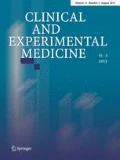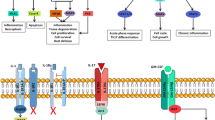Abstract
The hallmark of rheumatoid arthritis (RA) is chronic synovial inflammation resulting in progressive joint damage. Cytokines are key mediators of inflammation and can be found in abundance both in the joint and blood of patients with active disease. They are responsible not only for the destructive synovitis but also for some of the systemic features. Research over the last 2 decades has highlighted the important role of cytokines such as tumour necrosis factor alpha (TNF-α) and interleukins (IL) 1, 6 and 15 in the pathogenesis of RA and these are potential therapeutic targets. Inhibitors of TNF-α and IL-1 are already licensed treatments for RA. Novel biologic agents targeting IL-6 and -15 are currently being developed and showed promise in early clinical trials. This article reviews the role of various cytokines in the pathogenesis of RA and the therapeutic effect of inhibiting these cytokines.
Similar content being viewed by others
Author information
Authors and Affiliations
Corresponding author
Rights and permissions
About this article
Cite this article
Christodoulou, C., Choy, E.H. Joint inflammation and cytokine inhibition in rheumatoid arthritis. Clin. Exper.Med. 6, 13 (2006). https://doi.org/10.1007/s10238-006-0088-5
Received:
Accepted:
DOI: https://doi.org/10.1007/s10238-006-0088-5



